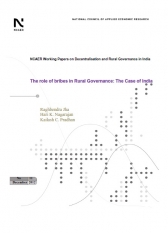Health Care in Rural India in the Context of Decentralization: Perception, Participation, Access and Burden
Veena S. Kulkarni
Hari K. Nagarajan
Kailash Chander Pradhan
December 2012
This study attempts to estimate and analyse the level of health-care expenditure incurred by the state governments and households in the rural sector of major states in India. It studies the interlinkage between public spending and household spending on health care. The utilisation of public and private facilities has also been analysed to provide a comprehensive view of the health sector in the context of the ongoing fiscal adjustment programmes. The household expenditure on health accounts for a major share of about 70-80 per cent of the total health expenditure in India. As a percentage of income, households spend about 5.40 per cent while the government spends only about 1.09 per cent in rural India, according to 1993-94 data. The structure of spending reveals that state governments spend largely on personnel in terms of salaries and wages, and households spend primarily on medicines, clinical charges, etc. This suggests that health spending by governments and households are complementary and not substitutes. The results of this study indicate a negative association between the overall economic development and prevalence rates of morbidity across the states. The analysis of household expenditure on the treatment of both short-duration and long-duration illnesses by various income levels clearly indicates that as income rises, the expenditure on health care also increases. A substantial proportion of poorer households in rural India depend on public health facilities for the treatment of short-duration and major morbidity. However, patients depend on private health facilities at higher levels of income. Similarly, dependency on indigenous practitioners is also found to decline at higher levels of income. Thus, any move to levy user charges or attempts to recover cost from public health facilities would impose a heavy financial burden on the poorer households and may discourage them from seeking any medical care.
Agriculture and Rural Development







